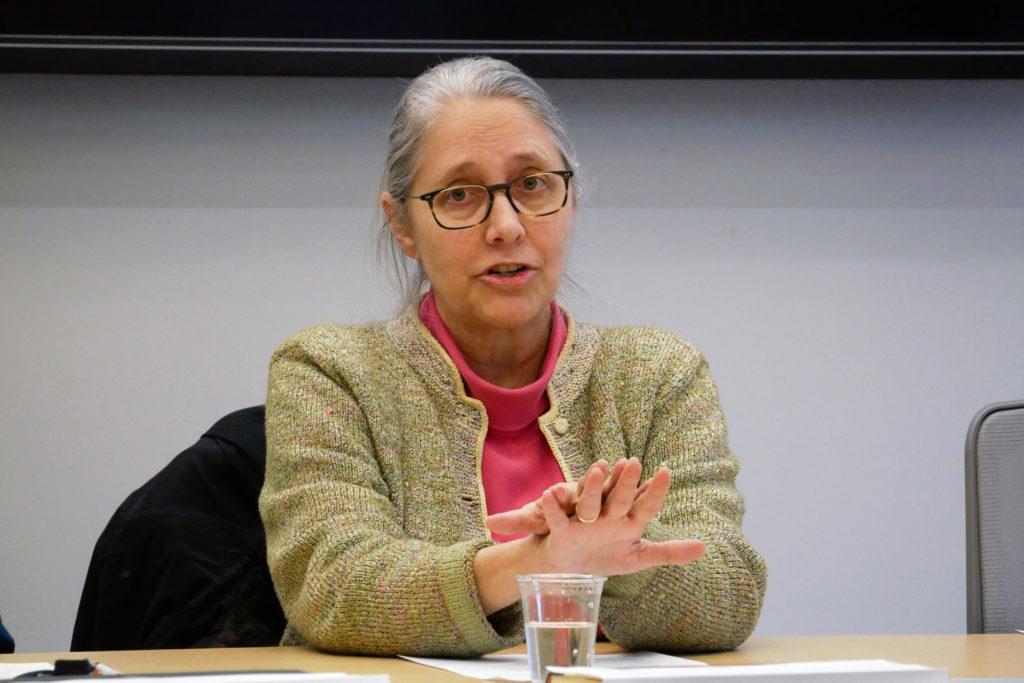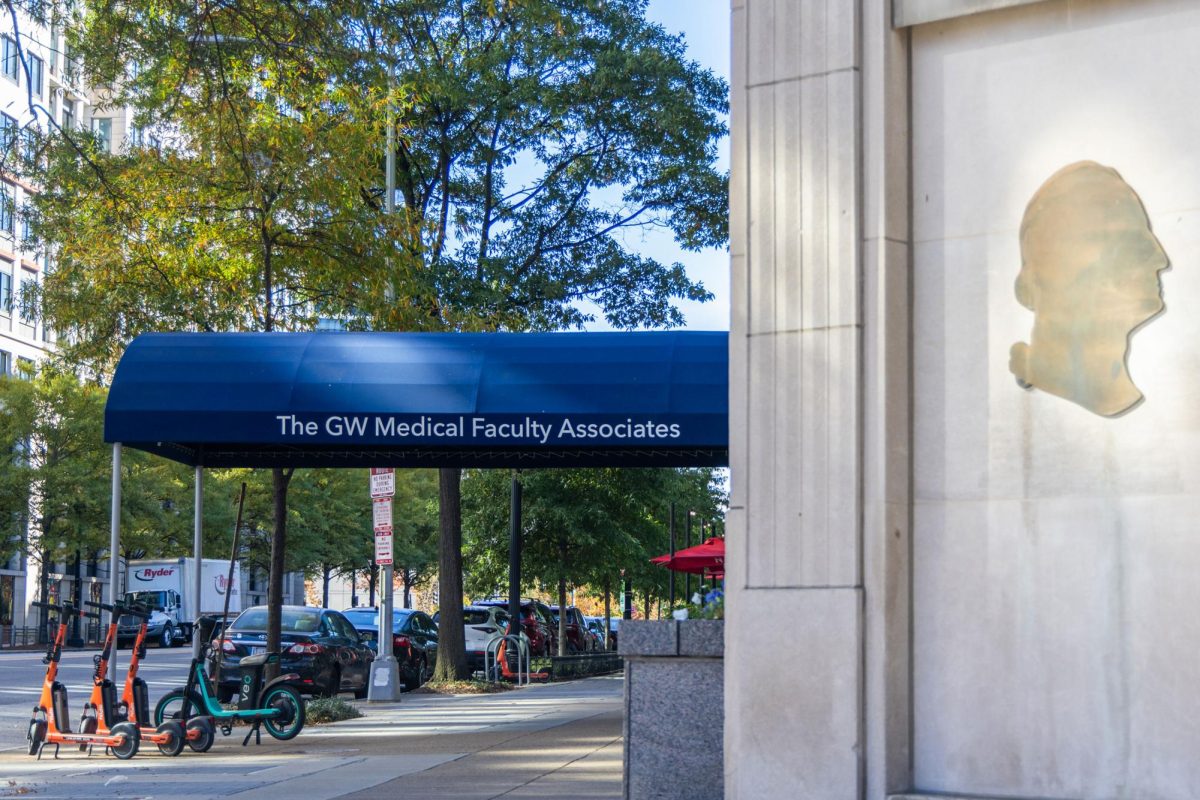The Faculty Senate unanimously passed a resolution Tuesday expanding a faculty committee that will consult with trustees to select GW’s next president.
Faculty senators said the move to elect up to eight additional professors for the faculty consultative committee, which will also include a professor in each of GW’s nine schools with senate representation, will enhance diversity among the group in areas like rank, discipline, gender and race. Members of the committee, who faculty senators said they hope to elect in September, could also be elected to serve on the Board of Trustees’ presidential search committee.
Faculty in each of the nine schools with representation will select a member for the consultative committee in line with procedures that date back to 1986, but the resolution authorizes the schools including the College of Professional Studies to each submit a pool of three to five additional professors to senate leadership to fill the potential expansion.
Kim Roddis, a faculty senator and a professor of civil and environmental engineering, said professors will approve the consultative committee’s members at a special meeting of the Faculty Assembly, where all full-time faculty serve as voting members, “as soon as feasibly possible” once the senate’s executive committee has finalized the slate.
Roddis said the executive committee hopes to determine the slate by Aug. 27, and the group invited schools begin the selection process in late July.
“To ensure a broad and diverse slate, the nine names from the school elections must be known,” a slide from Roddis’ presentation reads. “The school pools provide diversity. Timeliness demands quick action to get the full FA slate distributed in advance of the FA special meeting in September.”
Faculty expressed concerns during the last presidential search in 2016 that the search committee lacked diversity – the six faculty members who served on the search committee were all White and from science, math, law or medical fields. All but one were men.
In similar fashion, the senate voted in 2016 to expand the faculty consultative committee with seven additional members beyond the nine school representatives.
At the meeting, officials also provided updates on GW’s COVID-19 response and vaccination status among the University community.
Ray Lucas, the senior associate dean for faculty affairs and professional development and the University’s COVID-19 coordinator, said officials expect a “near universally” vaccinated campus during the upcoming school year, with the unvaccinated population “somewhere in the high one to two percent.” Officials announced last week that about 10 percent of the University community is currently not compliant with the vaccine mandate.
Lucas said the unvaccinated population consists of people with medical or religious exemptions.
“Since we know breakthrough infections can occur, we have this required surveillance testing,” Lucas said. “If you’re one of these two percent of people who are unvaccinated, you have to do a weekly COVID test and a daily symptom screener on an app for the duration of the fall semester.”
Senior Vice Provost Terry Murphy said 6.3 percent of students are not currently compliant with the vaccine requirement, but noncompliant students are largely those who have lost their vaccine documentation or are still obtaining a NetID that will allow them to upload such documentation.
She said 8.3 percent of faculty are also not compliant with the requirement – a group mostly composed of part time professors who are also waiting to receive a NetID.
“The deans have the names of every individual who is not compliant,” Murphy said. “They are going through the list, they are identifying those who have left the University, they are identifying those who are online and therefore will be moved in to another category that we call ‘opt in’ – if they are in Alaska we are not so concerned about whether or not they’ve gotten their COVID vaccine.”
She said officials expect to find breakthrough cases within the student population, and professors should expect more students than usual to miss class for up to two weeks at a time for isolation or quarantine purposes. Murphy said faculty should familiarize themselves with new recording technology in their classrooms for students who need to quarantine, and they can teach maskless in classrooms that have six feet of separation from their students.
Students who are not compliant with the vaccine mandate will not receive residence hall access, Murphy added.
“If they want to be on campus, they must comply with the vaccine mandate,” Murphy said. “There are names behind each of these numbers.”
Joseph Cordes, the chair of the fiscal planning and budget committee and a professor of economics, said the University will close fiscal year 2021 with some “positive margins” rather than a slight deficit that officials had initially anticipated in May, although the official numbers will be finalized later this month.
Interim Provost Chris Bracey provided an update on the University’s diversity audit with new plans that differ from those set by former Provost Brian Blake, who left GW to become president of Georgia State University in June. Officials commissioned the audit in January to assess and improve campus diversity with new initiatives and reforms that build off findings from an outside firm that would be selected from a pool of candidates.
Officials originally planned to receive findings by late spring, but as of June, they still had not selected a consultant after the firms requested more information than officials expected.
Bracey said he requested and received a “diversity effort review process” for the University designed by Caroline Laguerre-Brown – the vice provost for diversity, equity, and community engagement. The review process would draw upon proposals submitted by the two firms that officials were deciding between earlier this summer.
Bracey, who was named the interim provost after Blake’s departure, said the search for a vice provost for research is “winding up” with hopes to finish conversations with finalists sometime this week. Robert Miller left his position as vice president for research last fall to serve as dean of research and academic affairs at the School of Medicine and Health Science.
Arthur Wilson, the chair of the executive committee and an associate professor of finance, said the senate is preparing to speak with Board Chair Grace Speights about the future of shared governance at GW. He said members of a subcommittee circulated a draft to flesh out faculty’s interpretation of the meaning of shared governance earlier this week, with possible modifications to be made days later for the eventual meeting with Speights.
Speights requested further discussions with faculty about the future of shared governance earlier this spring when University President Thomas LeBlanc announced his plans to retire at the end of the next academic year. In an email to faculty, Speights said she was “troubled” by some professors’ behavior that did more to “foment discord” than contribute to civil dialogue.
The senate unanimously approved the nominations for membership to the senate’s athletic and recreation and research standing committees and welcomed the interim dean of nursing, Pamela Slaven-Lee, after former Dean Pamela Jeffries departed for Vanderbilt University earlier this summer.










